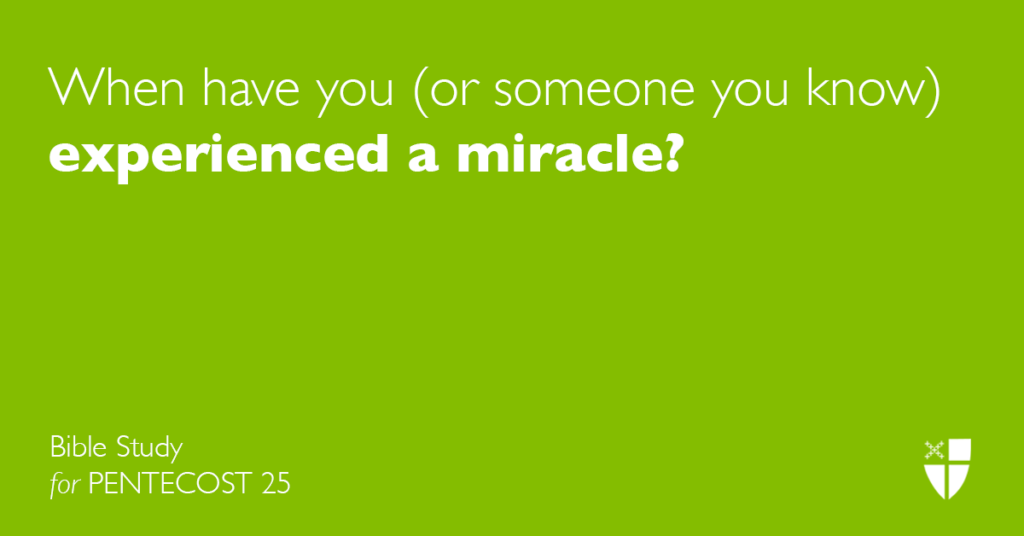This page is available in: Español
Bible Study: Proper 28 (B) – 2021
November 14, 2021
RCL: 1 Samuel 1:4-20; 1 Samuel 2:1-10; Hebrews 10:11-14 (15-18) 19-25; Mark 13:1-8

1 Samuel 2:1-10
In this ecstatic, prophetic and powerful song we witness a woman’s joy from experiencing a miracle. Her words are familiar, we hear similar ones erupt from the mouth of Mary when she too conceives a special child. In a world colored with grey areas, it can be difficult to say with certainty – This is from God! This is from the touch of the Spirit!
- When have you been able to say “the Almighty has done great things for me?”
- When have you (or someone you know) experienced a miracle?
- In our world we may have heard others tell us what is or is not from God. How do you discern when the Spirit has touched you or your community in a special way?
1 Samuel 1:4-20
Hannah can hardly pray without getting harassed! For her infertility she is mocked; for her prayers she is called a drunkard. “I am a woman deeply troubled,” she asserts, as she pours out her “great anxiety and vexation” (1 Sam. 1:15-16).
- What prayers and anxieties of today are too stigmatized to bring to the temple?
- What are we too ashamed of to pray for beyond a whisper?
- Women’s health has often been mythologized, ill-funded and provoked to cast to shame. Many of us have been touched by miscarriage, unwanted pregnancy and infertility. The God of Hannah calls us to cry out when our communities, partners or Church shame, stigmatize and mock the anxieties of our hearts. In this passage we see a testimony that God is a God of hope, transformation and solidarity – who is with us in whatever trial we find ourselves in?
Hebrews 10:11-14
This section of Hebrews has a clear message for us: Jesus’ sacrifice was unique a “single offering” (Heb. 10:14). We are confronted with an analogy of Jesus’ singular and special sacrifice made for sinners.
- How have you experienced the sacrificial and healing love of Jesus?
- Perhaps in the Eucharist or perhaps in your own experience of sin and forgiveness?
- How often do we think we can ‘save’ others or ourselves by our own sacrifice, sweat and blood?
- Or reform others through punishment?
We often have a destructive understanding of sin and sacrifice. Many think their own salvation comes from how much they take care of others, forsaking their own wellness. Our understanding of punishment can also carry violent notions of sacrifice. A friend of mine who was incarcerated for years for a minor crime stated that his experience imprisoned was so dehumanizing he felt as though “my very life blood was being squeezed out of me.”
- Where do we personally and socially see dehumanizing sacrifice; where do we need more grace?
Mark 13:1-8
This apocalyptic prophecy from Mark’s Gospel calls forth the question: how tied are we to our institutions and the present order? My experience as a human being tells me that I am addicted to comfort. I worship my own sense of safety and control over my life, image and wealth.
- How much does vulnerability scare us?
- How hard do we work to keep the walls of our lives up?
Our passage from Mark though tells us that “all will be thrown down.” As a culture we invest so much in keeping things the same. How many truth-tellers, from Malcolm X to our Lord Jesus Christ, have been executed in a vain attempt to maintain the present order? Our selfishness, addiction to comfort and desire for control guard us from entering into vulnerable spaces of change.
- What if instead of acting on our instinct to protect the walls that we construct, we acted first out of love?
- How would we be willing to change to accommodate refugees fleeing terror and violence?
- Instead of worshiping the idols of our institutional walls and status quo, let be transformed by the God of change and love, for indeed, “all things will be thrown down.”
This page is available in: Español
Don’t forget to subscribe to the Sermons That Work podcast to hear this sermon and more on your favorite podcasting app! Recordings are released the Thursday before each liturgical date.
Receive Free Weekly Sermons That Work Resources!
This page is available in: Español


